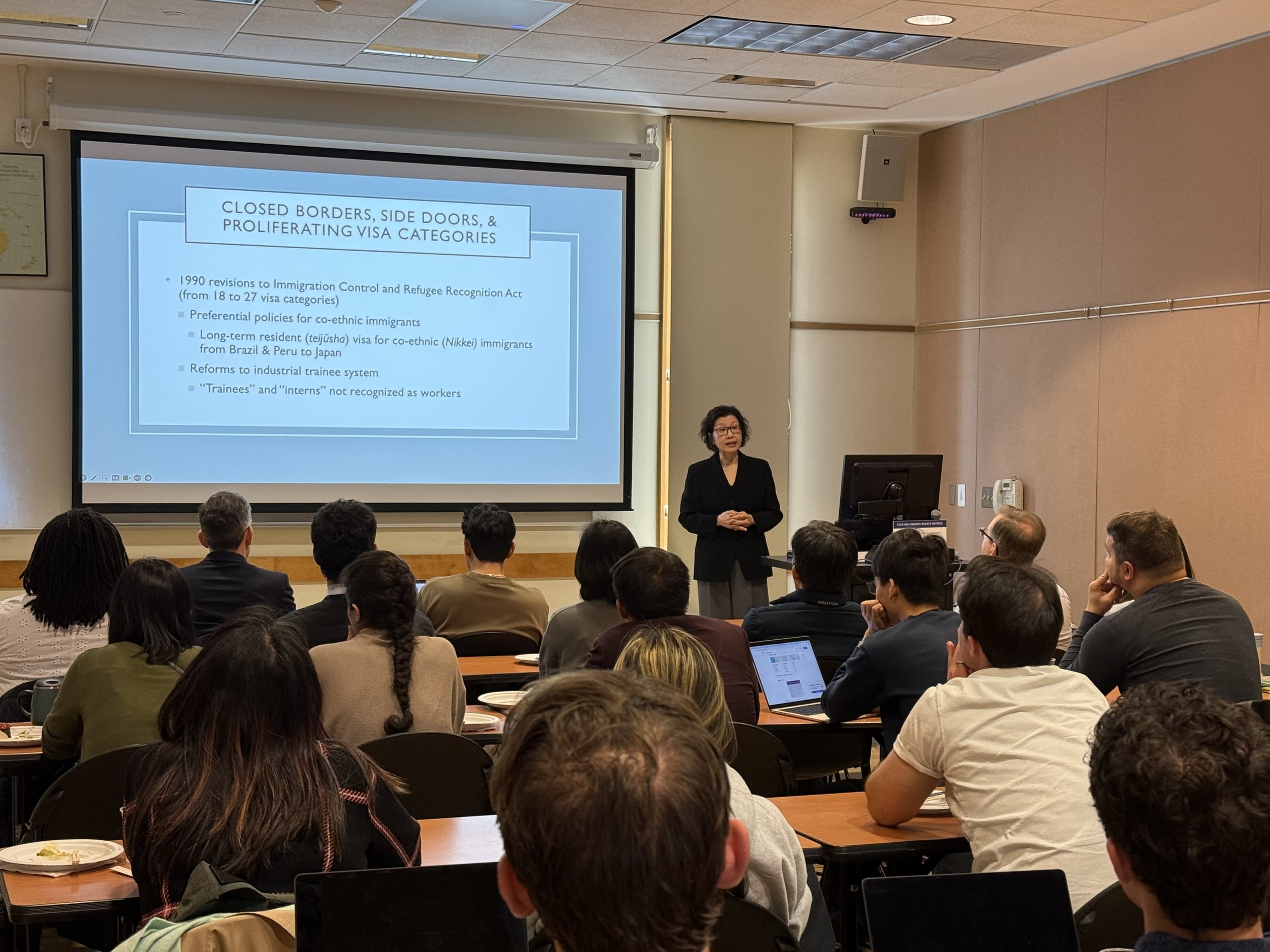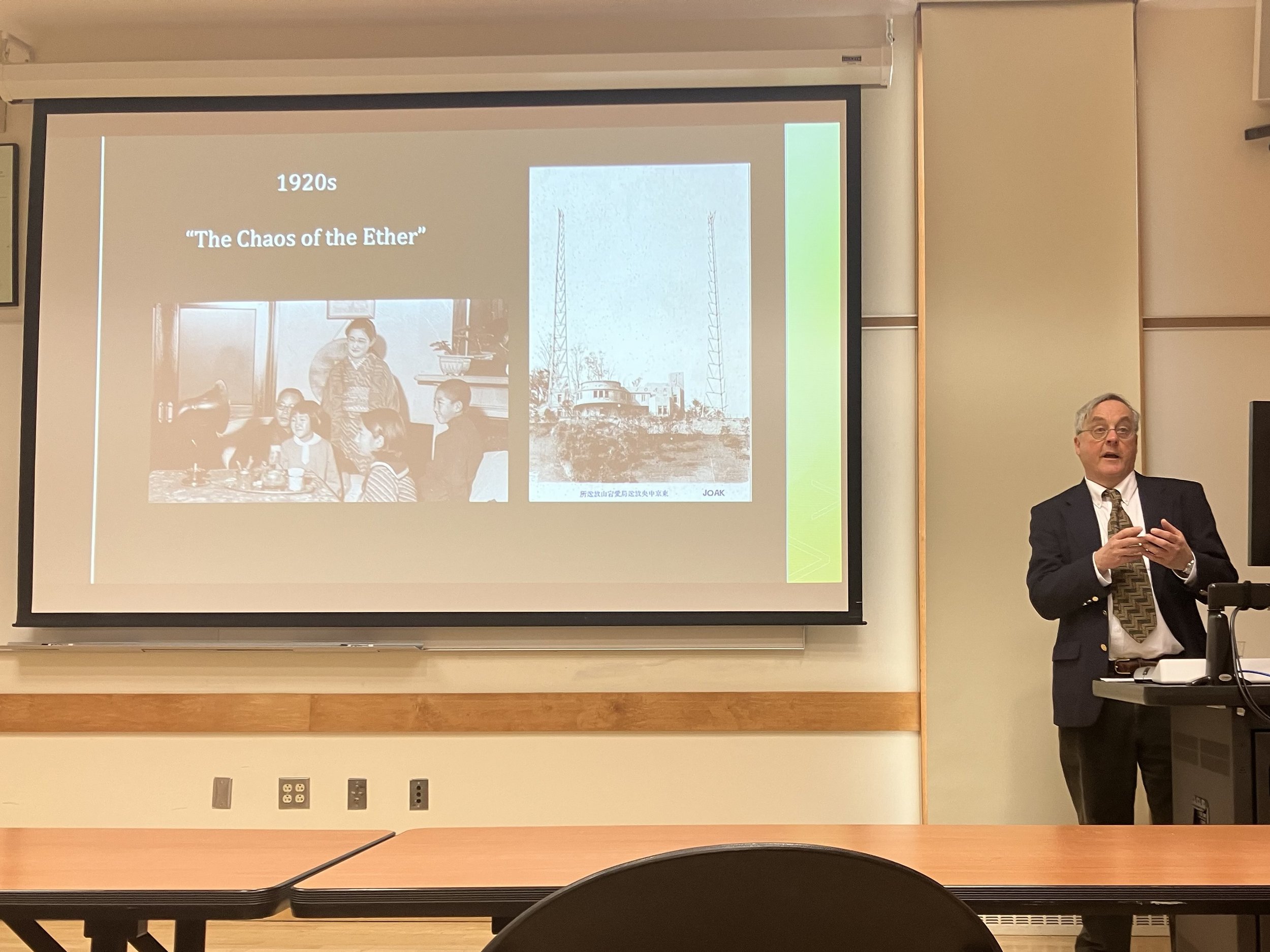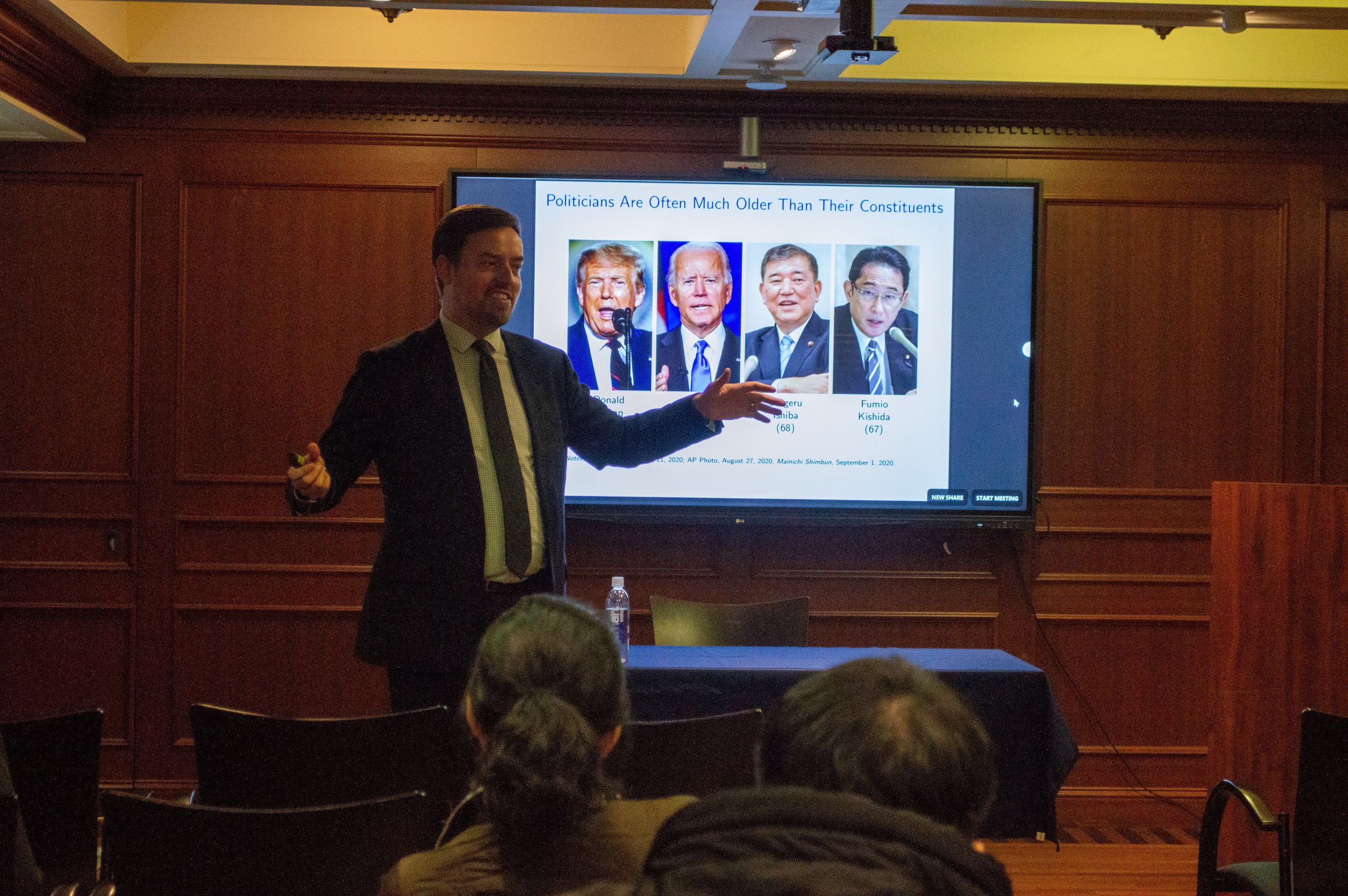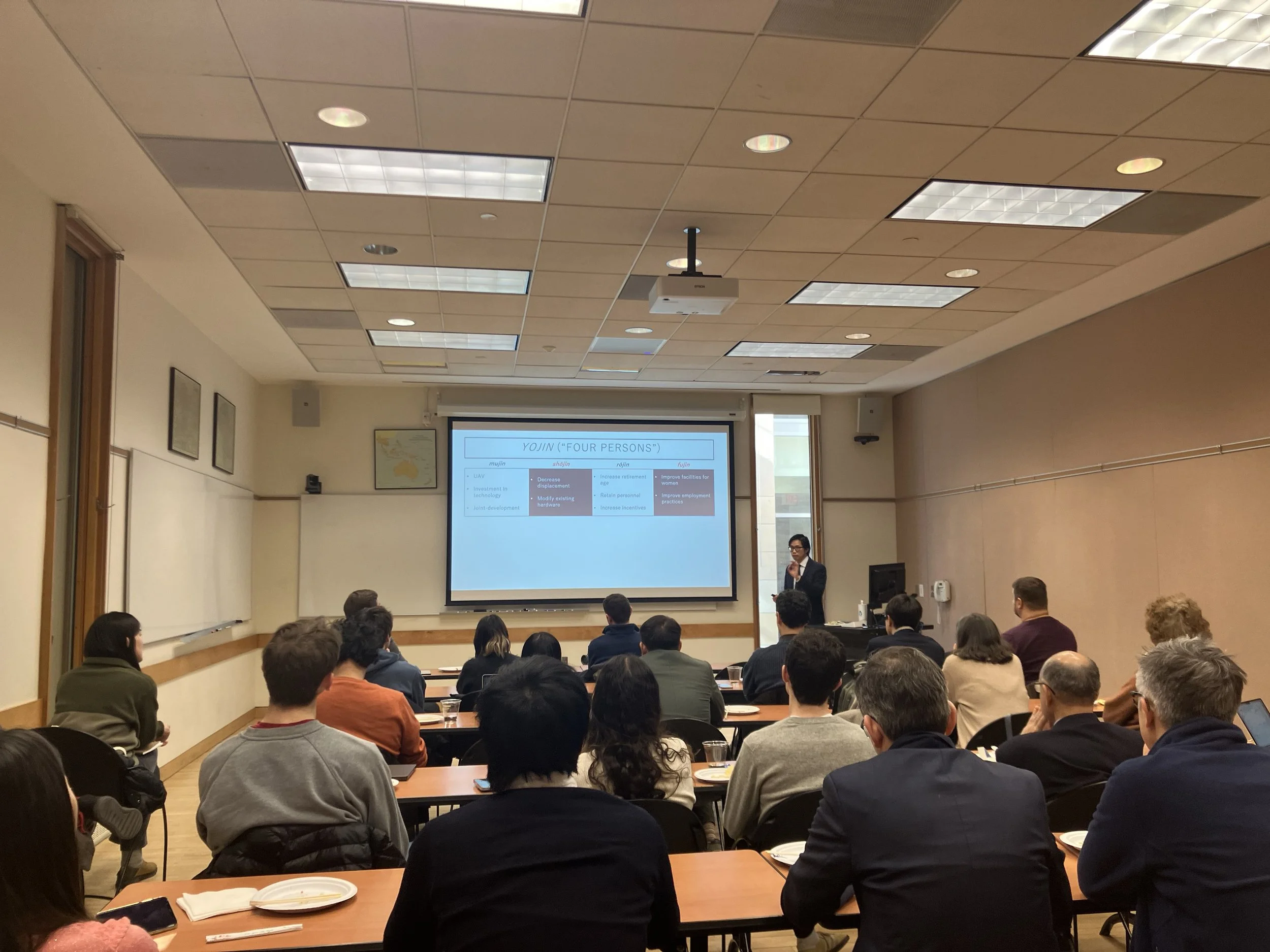Thank you to our five speakers for joining this year’s Yale MacMillan Center CEAS Japan as Future series! Special thanks as well to our postdoc, Alex Mathieu, for all her help organizing the series—and to the Japan Foundation for their generous support!
Japan as Future Lecture Series: Kenneth McElwain (University of Tokyo)
For the final event in our Japan as Future lecture series, Kenneth McElwain (University of Tokyo) joined us to discuss his work on public attitudes toward constitutional revision and their implications for democratic governance.
Japan as Future Lecture Series: Erin Aeran Chung (Johns Hopkins University)
For the fourth event in our Japan as Future lecture series, I was delighted to host Erin Aeran Chung (Johns Hopkins University) for a discussion on how Japan’s model of immigration control is increasingly becoming the norm globally.
Japan as Future Lecture Series: Junko Kato (University of Tokyo)
For the third event in our Japan as Future lecture series, I was delighted to host Junko Kato (University of Tokyo) for a talk on taxation, redistribution, and the politics of Japan’s welfare state.
Wesleyan: Deepening U.S.-Japan Ties Beyond Security
I visited Wesleyan University to join this great symposium on deepening U.S.-Japan ties beyond security. I discussed my book’s focus on gerontocracy and the struggle to get young people involved in politics—key challenges for both countries. Thanks to everyone who joined!
Japan as Future Lecture Series: Henry Laurence (Bowdoin College)
For the second talk in our Japan as Future lecture series, I was delighted to host Henry Laurence (Bowdoin College). He gave a fascinating talk about the politics of public broadcasting in Japan and Britain, comparing NHK with the BBC. For more on this topic, check out Henry’s recent book.
Georgetown: Walsh School of Foreign Service (Asian Studies Program)
On February 27, I had a great time discussing my book project at the Asian Studies Program in Georgetown’s Walsh School of Foreign Service. Grateful to everyone who came for their questions and feedback, and special thanks to Trevor Incerti for the invitation.
Postdoctoral Associates Lecture Series: Alexandra Mathieu
On February 26, I was delighted to chair a talk featuring our Japan Foundation Postdoctoral Associate Alexandra Mathieu. She shared her fascinating work on how personal biases and international status concerns shape public preferences in Japan.
Japan as Future Lecture Series: Tom Le (Pomona College)
Great to kick off our new Japan as Future lecture series at Yale’s Council on East Asian Studies with Tom Le (Pomona College)! He gave a fantastic talk on Japan’s “antimilitarism ecosystem” and how it constrains efforts to strengthen the Self-Defense Forces. For more information, check out Tom’s book, which dives deeper into these themes.
Once Again, Leadership Transitions Challenge US-Japan Alliance
In our latest article for Pacific Forum, Sheila Smith and I discuss Japan’s snap election and Ishiba’s minority government; Trump’s return and its impact on US Indo-Pacific policy; and the expanding US-Japan regional and global agenda.
Minority Governments Revisited
Kaare Strøm (UCSD) and I have a new book chapter out on Minority Governments Revisited! The chapter is part of Patrick Dumont, Bernard Grofman, Torbjörn Bergman, and Tom Louwerse, eds. New Developments in the Study of Coalition Governments. Studies in Public Choice, vol 9. Springer, Cham.
Abstract
Despite decades of scholarship on coalition bargaining in parliamentary democracies, minority governments remain a puzzle. From the 1970s on, cross-national empirical scholarship has shown minority governments to be surprisingly common across parliamentary democracies. Even though scholarship that sought to explain identify the conditions that favored the formation minority governments developed, our knowledge still remains somewhat parochial. In this chapter we ask whether our existing understanding of minority governments can be generalized to more recent decades and to recent democracies of Central and Eastern Europe. We review existing explanations of the incidence and performance of minority governments and ask whether they still apply in this broader context. We find that minority governments tend to form under disproportional bargaining power, a larger number of parties in parliament, when the vote of investiture is not required, and when even opposition parties can expect to have policy impact. Next, we inspect the governance mechanisms that permit minority governments to retain power. Finally, our analysis of their performance shows that although less durable than other cabinet types, minority governments are remarkably successful at the polls. This comprehensive analysis and our robust findings across regions and periods contribute to the “normalization” of minority governments.
Fletcher School: What's Next for Asia?
I was delighted to speak on a panel with Aram Hur for the newly launched Fletcher Asia Forum’s first event at The Fletcher School of Law and Diplomacy at Tufts University. We shared insights from our research and discussed long-standing issues in East Asia that shape its democratic and diplomatic future with the United States.
Louisville Center for Asian Democracy: Inside Asia Podcast
I had a great time joining David Buckley’s Inside Asia podcast at the University of Louisville’s Center for Asian Democracy to discuss the LDP's recent election performance—and what the results reveal about youth participation and representation in Japan's rapidly aging society. We also chatted about snap elections!
Tufts: Department of Political Science
I returned to my alma mater, Tufts University, to talk about my book project. It was great to reconnect and discuss how youth representation can shape public policy and democracy.
Harvard: Program on U.S.-Japan Relations
I visited Harvard University’s Program on U.S.-Japan Relations to discuss my book project on youth representation and its impact on policymaking and democracy—just a day after Japan's election!
Yale Young Global Scholars
Today, I enjoyed giving a talk about youth representation for a great group of 150 high school students from 50+ countries, who are here participating in the Yale Young Global Scholars program. It was particularly nice to hear their thoughts about ways we can encourage more young people to run for office.
Assistant Professor of Political Science, Yale University
Today is my first day as an Assistant Professor of Political Science at Yale University. This month also marks the 20-year anniversary since I first visited Japan and started studying the country. Here’s a photo from that first trip vs. today.
Economist: Japan's Youngest Ever Mayor
"Japan’s political system is not set up to reward the young." I shared insights from my research with The Economist for their story on Takashima Ryosuke, Japan's youngest ever mayor, elected at 26.
Capitol Hill: Mansfield U.S.-Japan Network for the Future
I visited Capitol Hill to discuss gerontocracy and youth representation as part of a Mansfield Foundation U.S.-Japan Network for the Future event.
Business Standard: Incumbency in Indian Elections
I spoke with Ashli Varghese at Business Standard about why incumbency rates tend to be lower in Indian elections compared to other democracies. The article features my 68-country study with Shane Martin and Kaare Strøm.
























